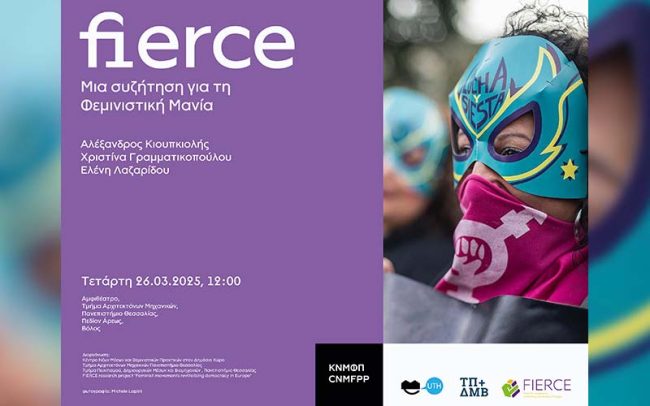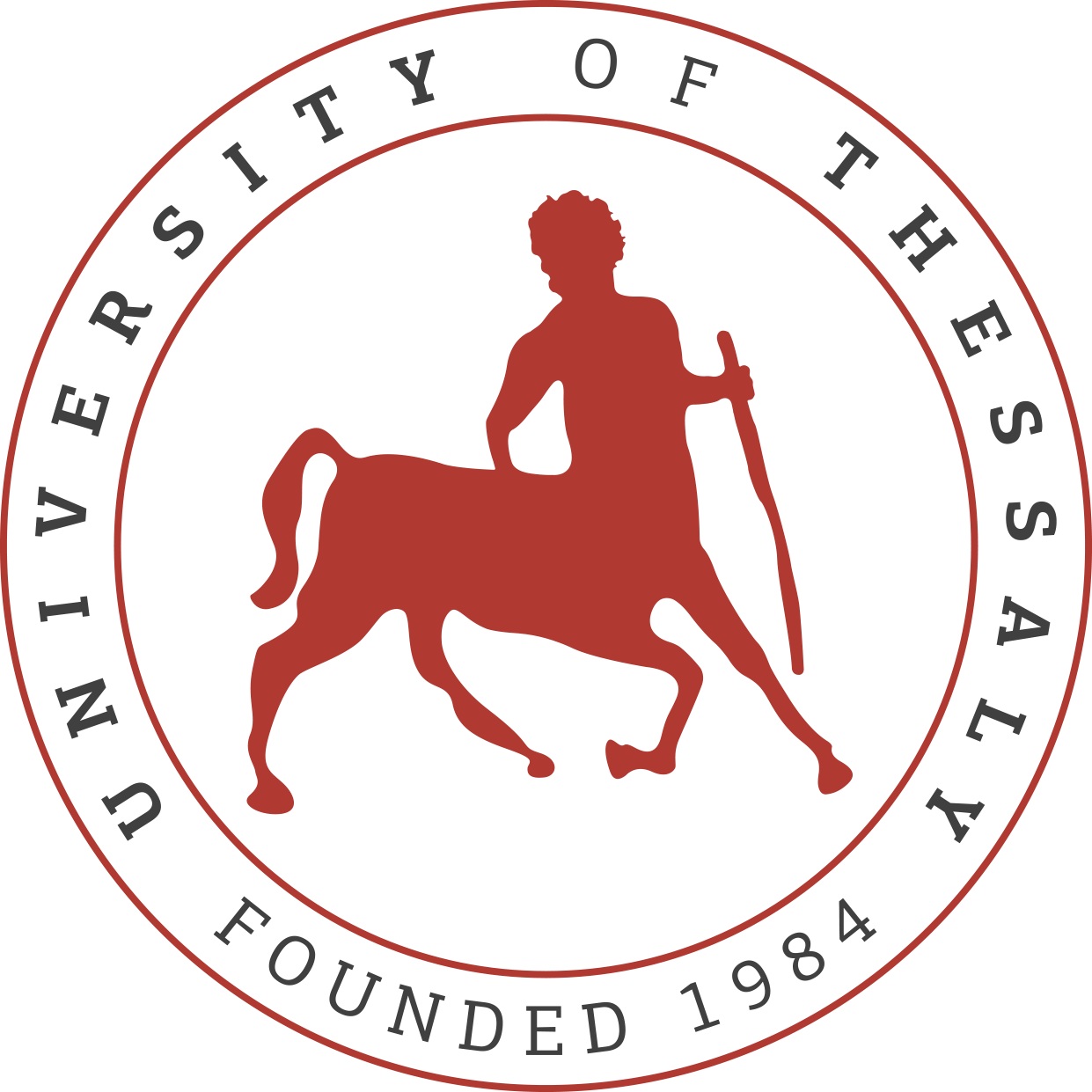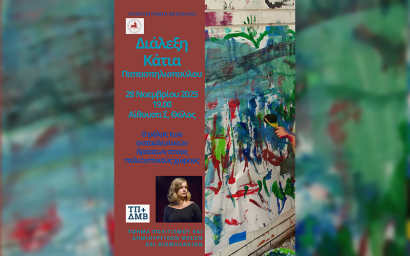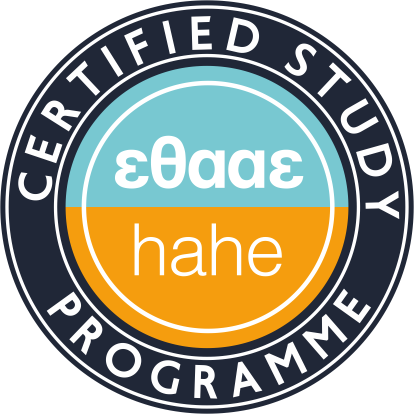FIERCE. A Discussion around the Feminist Mania

FIERCE. A Discussion around the Feminist Mania
Wednesday, March 26th 2025
12:00
Auditorium
Department of Architecture
University of Thessaly
Pedion Areos
Volos
The Centre of New Media and Feminist Public Practices of the Department of Architecture University of Thessaly, and the Department of Culture + Creative Media and Industries of the University of Thessaly invite you to the event:
FIERCE. A Discussion around the Feminist Mania
Alexandros Kioupkiolis, Christina Grammatikopoulou, Eleni Lazaridou as the research team of the FIERCE research program will talk about feminist mobilizations and networks of feminist movements and organizations against the new world order of exclusion, of witch hunts and the alarming rise of the far-right worldwide. The program is about producing common best practices of feminist mobilizations across Europe, of strategies for confronting the far-right in the face of a growing anti-feminist and anti-racist movement, of discourses, activities and the creation of a strong network of feminist movements and public institutions capable of defending and promoting women’s rights.
Brief Description of the Program
The FIERCE research project ‘Feminist movements revitalising democracy in Europe’ purports to revitalise the alliances between the feminist movement, civil society and political decision makers. It envisions to rekindle the movement-institution relationship by means of a multidimensional, bottom-up and impact-oriented approach. To this aim, it sets out to provide an in-depth understanding of feminist and antifeminist / anti-gender movements, activities and discourses, and their impact on the institutional arena and on policy outcomes, focusing on the period between 2010-2021.
The project is funded by the Horizon Europe Research and Innovation programme (2021-2027). It focusses on the systematic construction of eight national case studies including Denmark, France, Greece, Italy, Poland, Slovenia, Spain and Turkey. Going beyond the specific country-level contexts and their similarities/differences, the research project has designed in addition a comprehensive and cross-cutting comparative analysis based on five policy areas: Labour Market, Health & Reproductive rights, LGBTQ+ rights, Migration, Gender based violence.
Presentations by
Alexandros Kioupkiolis
Gender politics of equality and freedom, Greece, 2010-2023: action and reaction
Overview of the main findings of the research. The main features of gender movements in this period: emphasis on gender violence, queer, intersectional and performative turn, close interaction between grassroots and the academia, the mobilizations of mourning and rage/affection, from Ζ. Kostopoulos to Tempi, main organizational patterns (NGOs, autonomous grassroots collectives). Key features of the reaction dwelling on the ‘active dads’ campaign marked by international alt-right tactics.
Christina Grammatikopoulou
Femicides in Greece: Discourse and documentation
This presentation is based on research conducted within the FIERCE program on public discourse surrounding femicides in Greece. It will first analyse the Critical Framework Analysis methodology used in the study, exploring how it can be combined with other approaches, such as data feminism. Next, the key findings of the research will be presented, focusing on the contrasting perspectives on femicide: on the one hand, the punitive approach that dominates political discourse, and on the other, the systemic perspective advocated by feminist and LGBTQ+ movements. Finally, the presentation will highlight initiatives aimed at documenting and increasing the visibility of gender-based violence, with a particular focus on projects such as femicide.gr.
Eleni Lazaridou
Discourse Network Analysis (DNA) of antifeminist rhetoric in Greece: the ‘menacing’ Metoo and the ‘perilous’ immigrant women.
The application of Discourse Network Analysis (DNA) can highlight the convergences in anti-feminist and anti-LGBTQ+ discourses utilized by various social and political actors. One issue identified with DNA is the discourses against feminist and LGBTQ+ collectives, such as MeToo, against the rights of immigrant women. As can be seen from the annual charts, there is a gradual increase in ‘statements against’ in the articles of each year, while in 2021 an upsurge against the protection of women’s rights is also identified. Arguments of nationalist networks seem to focus on the diachronic protection of the nation from issues such as islamization, while at the same time actions of feminist and LGBTQ+ movements are targeted as intending to castrate men on one hand and on the other hand they are presented as a danger to traditional Greek values.
CVs
Alexandros Kioupkiolis is Professor of Contemporary Political Theory at Aristotle University, Thessaloniki, Greece. He has studied Classics (BA, University of Athens), and Contemporary Political Theory (MA, Essex University, DPhil, Oxford University). His research interests are focussed on radical democracy, the commons, social movements, and the philosophy of freedom. He has directed an ERC COG project on these topics (Heteropolitics, 2017-2020) and has published numerous relevant books and papers, including the monographs Τhe Common and Counter-hegemonic Politics (Edinburgh University Press 2019), Common Hegemony, Populism, and the New Municipalism: Democratic Alter-Politics and Transformative Strategies (Routledge 2022). He is the Principal Investigator of the FIERCE project.
Christina Grammatikopoulou is an Art Historian / Theorist (PhD, University of Barcelona (2013). Her postdoctoral research focused on the aesthetics of feminist resistance under the supervision of Professor Fotini Tsibiridou at the Department of Balkan, Slavic & Oriental Studies at the University of Macedonia (2020–2023). She has taught courses on digital culture at Aristotle University of Thessaloniki and the University of Western Macedonia. She is a member of the technofeminist collective #purplenoise. She currently works as a research associate at the University of Macedonia, at the Culture – Borders – Gender / LAB and a researcher at the FIERCE project.
Eleni Lazaridou is a PhD Candidate at the Department of Social Anthropology of the Panteion University and her doctoral research lies on the multimodal ethnographic approach of queerness, death and aging in digital cultures. She has completed her postgraduate studies in “Semiotics, Culture and Communication” in the Aristotle University of Thessaloniki and she is currently studying in the postgraduate program “Gender, Culture and Society” in the Department of Social Anthropology and History of the University of the Aegean. Her research interests are related to the study of sexuality, gender construction and self-representation, queer and transgenerational relations, and gender discourse in digital cultures, with particular regard to online game communities and network sites, as well as in the design of interactive social media narratives. She is currently participating in the Horizon project “Feminist movements and revitalizing democracy in Europe”.
Read also

The Role of Educational Activities in Cultural Spaces
The Department of Culture, Creative Media and Industries invites you on Friday, November 28, 2025, at 7:00 p.m., to Room Σ of the Papastratos building…
More
Culture Lab or making a new School for the Creative and Cultural Industries
November 26, 2025 18.00 Kordatos Amphitheater Haidy Geismar, UCL Ioanna Laliotou, UTH Chair: Konstantinos Kalantzis, UTH, UCL Introduction: Chrysi Laspidou, UTH In this…
More
South-South Dialogues: Spaces, Cultures, Languanges, Sciences
International Meeting Volos November 11-13, 2025 Erasmus + Mobility Program University of Thessaly & University of Cape Town From the 11th till the 13th…
More



